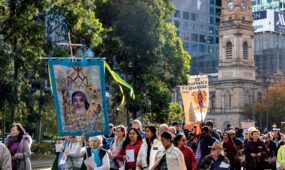Building trust - Towards Healing
Opinion
Towards Healing, established in 1996, is a process offered by the Church to a person who has been abused by a priest, Religious or other Catholic Church personnel. This month the Professional Standards Office answers some commonly asked questions about the process.

What does the Towards Healing process involve?
Towards Healing has three phases: contact, assessment and facilitation. The process can take anywhere from three months to more than a year, depending on the complexity of the case. There is a Professional Standards Office in each state and territory to coordinate and assist in the Towards Healing program.
Can the Towards Healing process be stopped?
Yes. The process can be stopped at any time. Also, if the person who was subjected to abuse as a child has begun Towards Healing and decides to go to the Police or pursue a civil process, Towards Healing will pause. Multiple processes cannot be run concurrently. Support such as counselling may continue to be provided. Towards Healing can recommence once a civil or criminal matter ceases or is completed.
Advertisement
How does someone bring a complaint to Towards Healing?
Complaints may be received by telephone, email or mail. The director of the SA and NT PSO is required to determine if allegations of abuse fit within the Towards Healing protocol.
Phase one – the contact report
A contact report (written and signed complaint) will be taken by a contact person, a professional whose role is to listen to and document the person’s story. Signing the contact report formally invokes the Towards Healing process.
Providing information for a contact report can be difficult. A support person can come along to the meeting. Previously submitted accounts or statements made to Police, lawyers or the Royal Commission can be part of the report. Counselling may be offered throughout the Towards Healing process. Only people associated with the Towards Healing process will see the report. Privacy and confidentiality are of the utmost importance.
Natural justice requires that the allegations are put to the accused in full, whether he/she is still acting in the Church or not. In some cases the accused is deceased and this isn’t possible.
Advertisement
Phase two – assessment
An assessment is an exploration of the facts of the matter. It is undertaken by an independent investigator who is appointed by the PSO director.
In some situations further information is required. Dates, names and whether a person was present at a particular time may need to be verified. The assessor is appointed to seek out this information.
An assessment is not an adversarial process as in a criminal or civil law matter and does not have the power to convict or prosecute.
Assessments may take time and be stressful. The PSO encourages people to bring along a support person and to tell the PSO if they have enough support.
The assessor provides a finding based on the balance of probabilities.
Phase three – facilitation
Facilitation is a pastoral meeting conducted by an independent professional called the facilitator who is appointed by the PSO director to meet with both parties individually, and determine their needs and the Church’s response to them.
Related Story
 Opinion
Opinion
Building trust
A person’s experiences and statements are his or her truth. Regardless of the findings of the assessment, there is an opportunity to meet with a Church authority. The purpose of this meeting is for the Church authority to compassionately and sincerely hear the person’s story and respond. This meeting is offered, but does not have to be attended.
People are entitled and encouraged to have the benefit of whatever support they need, including legal support, if this will help them have a clear understanding of any of the outcomes of the facilitation. Legal consultation in relation to rights under civil law is also encouraged.
Contacting the Police
Child sexual abuse is a crime. Historical child sexual abuse matters can be criminally prosecuted in SA and NT. We strongly encourage anyone who has been abused as a child to contact the Police. PSO can assist with this if necessary.
To contact the PSO for a consultation and/or advice, phone 8210 8275 or 1800 139 020.
Next month the PSO will feature information on the National Redress Scheme. Adelaide Archdiocese, Diocese of Port Pirie and Darwin Diocese have signed up to the scheme.
(www.nationalredress.gov.au).







Comments
Show comments Hide comments